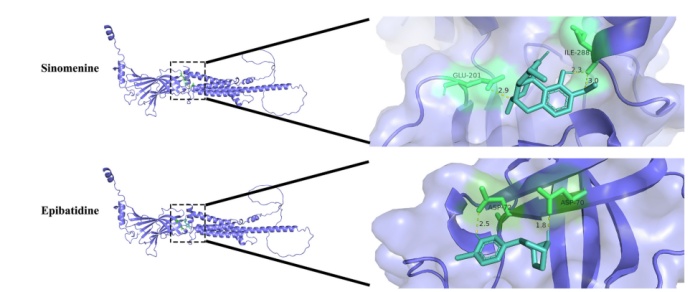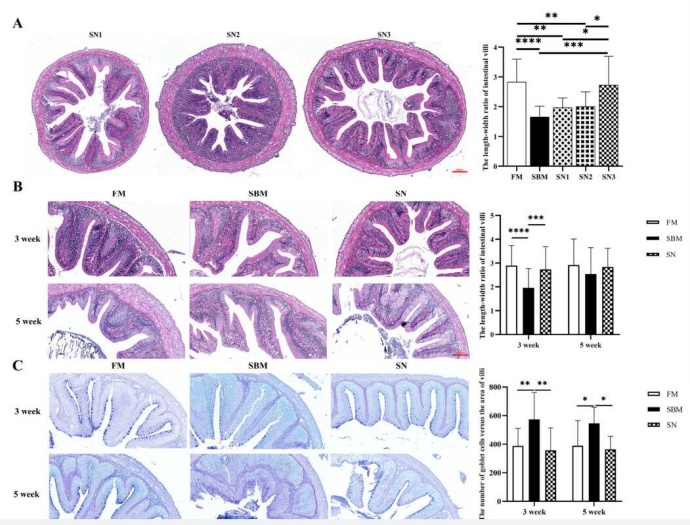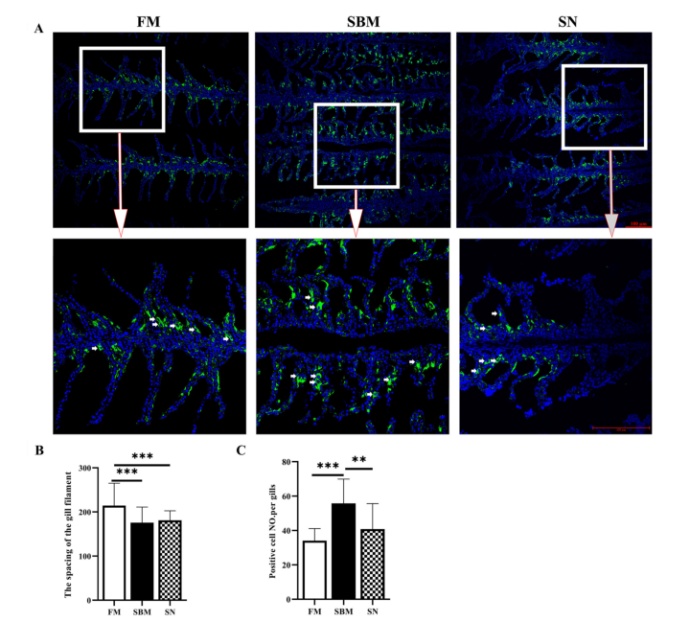
Newsroom
The Mechanism by Which Sinomenine in Aquaponics Uncovers the Prevention of Enteritis and Bacterial Infection in Fish by Protecting Mucosal Immunity
A complete replacement of antibiotics in the development of fisheries medicines is an inevitable tendency, considering the current need for green aquaculture. Researchers from the Fish Functional Genomics Discipline Group of the Institute of Aquatic Sciences, based on previous research in zebrafish, a model animal, conducted research on the anti-enteritis and anti-bacterial diseases of Sinomenine, an effective ingredient from the traditional Chinese medicine Qingfeng vine, in grass carp, a common farmed fish in China. As an agonist that binds choline receptors to grass carp (Figure 1), the addition of Sinomenine to the diet activates the cholinergic anti-inflammatory pathway in intestinal mucosal tissues to immunomodulate mucosal inflammation.

Fig.1 Schematic diagram of the molecular docking between Sinomenine and ɑ7nAchR protein of grass carp
Recently, a research group led by Prof. WANG Yaping from the Institute of Hydrobiology (IHB) of the Chinese Academy of Sciences illustrated Sinomenine improves resistance to foodborne enteritis and Anti-bacteria mucosal immunity in grass carp. This study was published in Aquaculture.
In this study the protective effect of Sinomenine on mucosal immunity of farmed fish, juvenile grass carp were supplemented with soybean meal by adding Sinomenine to the diet. Soybean meal-induced enteritis was modeled by a 5-week feeding experiment, and then the histopathology of intestinal liver and the expression of enteritis-related genes were analyzed, and the mechanism at the molecular level and microbiota level was analyzed by transcriptome and 16S rRNA gene sequencing system. The results showed that the addition of Sinomenine hydrochloride at a concentration of 2 g/kg to the diet prevented inflammatory pathological changes in the intestinal mucosa, such as a decrease in the number of goblet cells and an increase in glycogen caused by the addition of 40% soybean meal (Figure 2).

Fig.2 Histopathological section of the anti-enteritis effect of Sinomenine feed supplemented
At the molecular level, downregulation of pro-inflammatory genes was observed, as well as upregulation of anti-inflammatory genes such as IL10, IL13, and TGFβ. At the omics level, enrichment analysis of differentially expressed genes showed that the down-regulated pathway "phagosome" and the term "platelet activation" in intestinal tissue indicated inflammation control, while the up-regulation of "PPAR signaling pathway" in intestinal liver indicated enhanced immune homeostasis. Due to the influence of the gut-liver axis, liver metabolism is altered, in particular, "fatty acid degradation" and "tryptophan metabolism" are upregulated. On the intestinal mucosal surface of the Sinomenine group, we observed not only control of pathogenic Campylobacter and Aeromonas, but also an increase in Firmicutes, Actinomycetes, and Cetacetobacterium, which may be beneficial for improving mucosal immunity.

Fig.3 The challenge experiment after the feeding experiment showed that the survival rate of Sinomenine group was increased after immersion in Aeromonas hydrophila
Subsequently, after 7 days of immersion in Aeromonas hydrophila, the Sinomenine group showed a significantly higher survival rate than the soybean meal group (Figure 3) and had less inflammatory CD4 signal in the gill tissue (Figure 4). However, it was also found that the presence of intrahepatic hypoxic signal and the small distance between gill filaments meant low respiratory efficiency, which may be a side effect of Sinomenine.

Figure 4: Sinomenine group alleviates the aggregation of CD4+ T helper cells in gill tissue after immersion in Aeromonas hydrophila
In summary, Sinomenine has a protective effect on mucosal immunity of the intestine and gills, can prevent foodborne enteritis, and ameliorate the subsequent death caused by bacterial challenge. Therefore, Sinomenine can be used as a candidate for traditional Chinese medicine substitute antibiotic in aquaculture, at least through the way of aquatic feed additives to exert anti-inflammatory and antibacterial effects.
This work was funded by the supporting project for developing industrial science and technology, Jiangxi innovation and incubation center of industrial technologies, Chinese Academy of Sciences (ZKYJXZXCY-202210), as well as the grant from National Natural Science Foundation of China (31872592), which was hosted by Associate Professor Nan Wu, and the National Natural Science Foundation of China (31872592). Under the joint funding of the above projects, it was completed by Master’s students Liu Yuhang, Cao Danying, a doctoral student, and others. Professor Xiao-Qin Xia and Associate Professor Nan Wu are the co-corresponding authors of this paper. The research results were published in Aquaculture, a journal in the first region of the aquatic field, under the title of "Sinomenine improves resistance to foodborne enteritis and Anti-bacteria mucosal immunity in grass carp".
(Editor: WANG Hongxia)